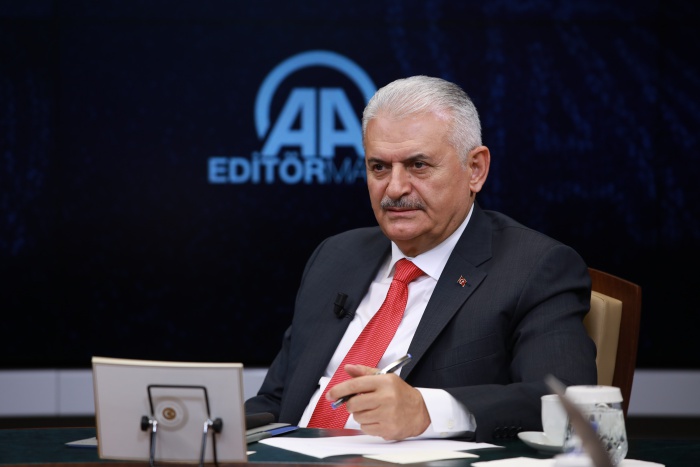According to an investigative journalist citing data from maritime tracking websites, a shipping company with close links to former Turkish prime minister Binali Yıldırım, a close confidant of President Recep Tayyip Erdoğan, continued to send cargo to and from Israel during the height of the conflict in October and November – despite the Turkish government’s harsh anti-Israel rhetoric.
Between Oct. 16 and Nov. 7, the ships Hazar S and Sun S, which belong to Oras Denizcilik, entered the Israeli port of Haifa several times, according to an investigation by journalist Metin Cihan, the details of which he shared on X, formerly known as Twitter.
Oras Denizcilik is owned by Salih Zeki Çakır, a close associate of the former prime minister. Çakır is a known shipowner who employed Yıldırım briefly before his career in government.
Yıldırım’s son Erkam’s offshore company established in Malta shows “care of Oras Denizcilik” as the company address.
According to a previous investigation by Cihan, another shipping company with links to Erdoğan’s son Burak was also loading cargo in Israel during the height of the Gaza conflict in October.
Manta Denizcilik, owned by Mert Çetinkaya, who also co-owned MB Denizcilik with Burak Erdoğan, sent a ship to Israel like Oras Denizcilik.
The links to Burak Erdoğan and Erkam Yıldırım in both cases are through shared addresses and the same areas of activity with the companies in question and companies owned by Erdoğan and Yıldırım.
“Although the strictness of regulations about such matters changes from country to country, the fact that the companies have similar shareholders, the same registered addresses, the same areas of activity indicate organic links between these companies, according to a previous ruling by Turkey’s Supreme Court of Appeals,” Brussels-based lawyer Ali Yıldız told Turkish Minute.
This means that this degree of commonality under Turkish law can lead to legal obligations for the persons involved in the event of a dispute as they can be seen as shell companies, according to Yıldız.
Yıldırım family’s shipping empire
In 2017 an investigation by European Investigative Collaborations (EIC) into then-prime minister Yıldırım’s family business revealed that the family possesses shipping and related assets exceeding 100 million euros.
Their business includes 11 foreign-flagged ships managed through a network of companies in Malta, the Netherlands, the Netherlands Antilles and possibly the Marshall Islands and Panama. The shipping operation, obscured in tax havens and opacity, is financed through substantial loans from Swiss and Turkish banks.
Yıldırım’s career in shipping started in 1994 with İstanbul Fast Ferries Company (İDO) owned by the city, which was then governed by newly elected mayor Erdoğan. Yıldırım was dismissed in 2000 due to a scandal involving favoritism towards his uncle. Unfazed, Yıldırım shifted to politics, joining Erdoğan’s Justice and Development Party (AKP) in 2001 and subsequently becoming minister of transport after the AKP’s 2002 election victory. Despite parliamentary inquiries, Yıldırım has been reticent about discussing his family’s business operations, only stating that he handed over his shipping business to his children upon becoming a deputy in 2002.
The EIC investigation traced the Yıldırım family’s shipping network to Malta-based entities like Dertel Shipping Limited, Nova Ponza Limited, Rory Malta Limited and Nova Warrior Limited, managed by Süleyman Vural, Yıldırım’s nephew and Erkam, his son. These companies, along with others in the Dutch Caribbean, are part of a sophisticated structure designed to obscure ownership and minimize tax liabilities.
The first traces of the Yıldırıms’ offshore adventures appear in Malta in 1998, via a company that alludes to the Turkish provenance of its shareholders — Tulip Maritime Limited.
This was headed by the former prime minister’s uncle Yılmaz Erence and contacts from Turkey’s political and business world. These included Çakır and Ahmet Ergün, President Erdoğan’s advisor from his days as İstanbul mayor, as well as a former deputy and high court judge, Abbas Gökçe.
According to revelations by Erdoğan’s former confidant Ali Yeşildağ, Yıldırım himself is just a keeper of a vast fortune that belongs to Erdoğan, who put him in charge of İstanbul city’s ferry company and to whom he owes his career.
Trade with Israel
After Palestinian militant organization Hamas launched attacks on southern Israel from the Palestinian enclave of Gaza on Oct. 7 that killed 1,200 people and resulted in the taking of 240 hostages, Israel retaliated by pounding Gaza, leading to thousands of civilian casualties.
Israel’s harsh response drew criticism from around the globe, while backlash in the Islamic world was particularly pronounced. Turks took to the streets to protest Israel, while vigilante boycotts against pro-Israel companies degenerated into mobs attacking customers for choosing the wrong coffee shop to frequent.
Erdoğan, who long marketed himself in the Muslim world as the champion of Palestinian rights and a strong critic of Israel, was unusually moderate in his tone in the initial days of the conflict and even offered to mediate between the sides.
However, as public outrage grew over the death toll in Gaza, the Turkish president could not afford to remain silent and unleashed a harsh rhetoric that has shown no signs of abating, which has culminated in him repeatedly accusing Israel of being a “terrorist state” while praising Hamas as “liberators.”
The revelation that Erdoğan and his close circle continued trade with Israel drew the ire of critics who pointed out the hypocrisy of condemning Israel at the government level while privately pursuing a lucrative trade with the country.
Cihan had previously uncovered the scale of Turkey’s trade with Israel, saying on Nov. 11 that 253 ships have sailed from Turkey to Israel since Oct. 7, carrying cargo such as crude oil, fuel, iron and steel. Cihan also shared a list of ships transporting the goods from Turkey to Israel, emphasizing that the shipments are still ongoing.

